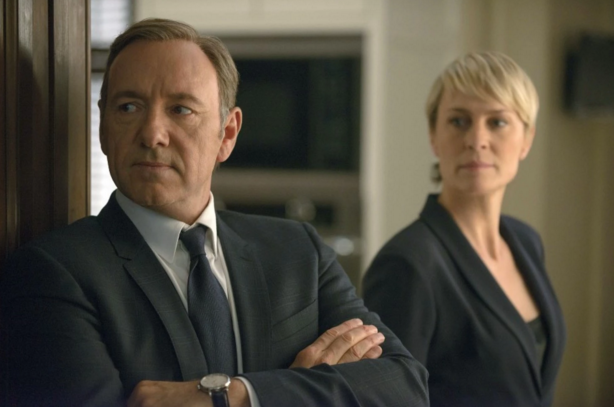By Connor Smith
Social Media Editor
Kevin Spacey returns as the devious President Frank Underwood in the fourth season of the award-winning Netflix drama, “House of Cards.” The 13-episode season premiered on Friday, March 4, bringing audiences on a wild ride of drama, betrayal and surprises that you’d expect from an episode of “Game of Thrones.”
After a falling out with his wife, Claire, portrayed by Robin Wright, Underwood is forced to regroup with the pressures of an increasingly-bloody Democratic primary complicating an already unstable presidency. As Underwood’s vile past comes back to haunt him, he must cope with the reality that certain things are out of his control.

Skyrocketing gas prices and a diplomatic conflict with Russia might be the least of Underwood’s concerns this season. Elizabeth Marvel is back as the morally-grounded Democratic candidate Heather Dunbar. While both she and Underwood must explore every possibility for voter support, Republican frontrunner Will Conway looms in the distance, gearing up for the election with a combination of charm and Machiavellian tactics that are reminiscent of a young Underwood.
This season’s greatest strength lies with its characters and how they adapt to some of the series’ most audacious writing. The Underwoods must hurdle a laundry list of obstacles that would bring any reasonable person to their knees.
Many of the major conflicts come close to breaking suspension of disbelief. However, the emotional drive that flows throughout each episode makes the show as addicting as it is improbable.
Although Underwood’s presidency is at the center of every storyline, it’s his wife’s evolution from a supportive spouse to a more independent leader that causes the most ripples in the White House. Despite being the cause of the show’s countless conflicts, Claire does a fine job of keeping herself in the audience’s good graces.
Redemption is also a common theme, as characters — both good and bad — are given second chances to right their wrongs. Ironically, it’s the characters with a moral high-ground who the viewer will find themselves rooting against. By demonizing innocent reporters and clean politicians, the show’s best interests often tussle with one’s good conscience. It’s a feeling that is quite in-tune with the popular dynamics of “Breaking Bad,” although you could argue one is more nuanced than the other.
Derek Cecil’s performance as the cunning Director of Communications Seth Grayson helps foil the stone-cold demeanor of fan-favorite Doug Stamper, portrayed by Michael Kelly, while newcomer LeAnn Harvey (Neve Campbell) adds a new dynamic to Stamper’s reign over Underwood’s inner-circle.
The writing for season four is clever, as always. Each episode features a rotating list of lead writers, but the continuity does not suffer one bit. Almost every character undergoes massive evolutions from the beginning of the season, for better or for worse. Despite over nine hours of content, season four of “House of Cards” will leave you anxiously waiting for any tidbit of news for the upcoming season five.
If you’re tired of following the ongoing antics of the 2016 presidential race, then the new season of “House of Cards” is a great reminder that perhaps this race could be a lot worse — or better, depending on your perspective.






